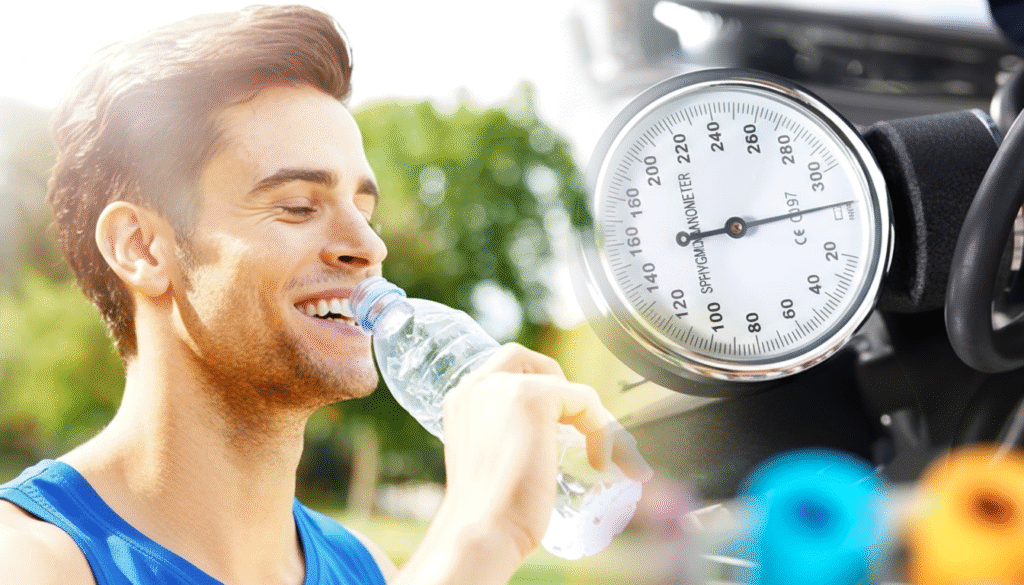Can a Glass of Water Affect Your Blood Pressure?
Water doesn’t just quench thirst—it’s literally the medium through which our bodies function. Since the human body is about 60% water, every organ, cell, and system relies on it. Yet here’s something many people overlook: even mild dehydration can influence your cardiovascular system, including blood pressure control.
And because high blood pressure is one of the leading silent killers worldwide—fueling heart disease, stroke, and kidney problems—understanding how hydration plays into it isn’t trivia. It’s frontline preventive medicine.
In this in‑depth guide, you’ll learn:
- Whether dehydration really causes high blood pressure
- The step‑by‑step physiology behind it
- How to distinguish dehydration symptoms from hypertension
- Who is most at risk of dehydration‑driven blood pressure changes
- Practical hydration strategies backed by science
- What the long‑term risks are if you chronically skimp on fluids
Grab a glass of water (for science!), and let’s dive in.
Does Dehydration Really Cause High Blood Pressure?
The short answer: yes—sometimes. But like all things in medicine, it’s nuanced.
Dehydration can temporarily increase blood pressure in many people, primarily due to the body’s compensatory survival mechanisms. However, in severe dehydration, blood pressure can plummet dangerously low. So, while dehydration may not be the root cause of chronic hypertension, it can aggravate it or influence short‑term readings.
How Dehydration Influences Blood Pressure
Think of your cardiovascular system like plumbing. If there’s less fluid in the pipes, the system compensates by tightening the pipes. That’s dehydration in a nutshell—but with hormones, nerves, and electrolytes joining the chorus.
Here’s what actually happens:
- Reduced Blood Volume
Less water means less blood volume (hypovolemia). With less fluid, your heart must work harder, and vessels may constrict to keep vital organs perfused. - Hormonal Cascade: Vasopressin + RAAS
- Dehydration triggers vasopressin (antidiuretic hormone) → kidneys retain water, blood vessels constrict.
- The renin–angiotensin–aldosterone system (RAAS) also activates → sodium retention + angiotensin II (a potent vasoconstrictor).
- Electrolyte Imbalances
Reduced intake raises serum sodium concentration. An imbalance in sodium and potassium can interrupt smooth blood pressure regulation. - Stress Hormones
Elevated cortisol and adrenaline sometimes accompany dehydration, pushing pressure up even further.
Bottom line: Mild to moderate dehydration often causes temporary spikes in blood pressure. Severe dehydration, however, can cause dangerously low readings due to extreme loss of blood volume.
Is It High Blood Pressure or Just Dehydration Symptoms?
Here’s the tricky part: dehydration and high blood pressure can feel eerily similar.
| Symptom | Dehydration | Hypertension |
|---|---|---|
| Headache | ✔ | ✔ |
| Dizziness/lightheadedness | ✔ | ✔ (sometimes) |
| Fatigue/weakness | ✔ | ✔ |
| Dry mouth | ✔ | ✖ |
| Dark urine | ✔ | ✖ |
| Often symptom‑free? | ✖ | ✔ (the “silent killer”) |
💡 Key takeaway: Without using a blood pressure monitor, you can’t confidently tell the difference. Measuring is essential.
Who Is Most at Risk for Dehydration‑Linked Blood Pressure Changes?
Hydration affects people differently. The groups below should be extra cautious, as their bodies either lose water faster or struggle to compensate:
- Older adults – The thirst mechanism weakens with age.
- People on diuretics or blood pressure medications – More fluid leaves the body via urine.
- Athletes & outdoor workers – Heavy sweating without proper replacement equals quick dehydration.
- Those in hot/humid climates – Heat stress drives rapid fluid/electrolyte loss.
- People with chronic illnesses – Kidney disease, diabetes, autonomic disorders all impair water balance.
How Much Water Do You Actually Need?
Forget the oversimplified “8 glasses a day.” Hydration is more individualized.
U.S. National Academies of Sciences Recommendations:
- Men: ~3.7 liters (125 ounces) daily fluids
- Women: ~2.7 liters (91 ounces) daily fluids
👉 Remember: this includes all fluids (not just water) and moisture from foods like fruits, soups, and vegetables.
Practical hydration test:
- Pale yellow urine = good.
- Dark yellow/amber = drink more.
Step‑by‑Step: Staying Hydrated for Healthy Blood Pressure
- Start Your Morning With Water → Replace overnight losses.
- Keep a Reusable Bottle Handy → Visibility = habit formation.
- Add Flavor Naturally → Lemon, cucumber, mint make plain water less boring.
- Balance Electrolytes After Sweating → Coconut water, bananas, or electrolyte tabs.
- Eat Water‑Rich Foods → Watermelon, cucumber, spinach, oranges.
- Sip Steadily → Your body absorbs fluid better with frequent small sips.
- Adjust to Context → Heat, exercise, altitude, illness = higher needs.
⚠️ Note: Overhydration is rare but possible, especially in kidney/heart diseases. It can dilute sodium (hyponatremia). Balance is key.
Can Drinking Too Little Water Cause Long‑Term Hypertension?
Science here is still evolving—but there’s growing evidence that chronic low hydration may contribute to sustained hypertension.
- Vasopressin Activation: Long‑term dehydration → persistently elevated vasopressin → vascular constriction & cardiac strain.
- RAAS Activation: Chronic stimulation contributes to structural vessel changes.
- Observational Studies: Populations with higher water intake show lower rates of hypertension over years.
While causation isn’t 100% proven, dehydration looks like a “background amplifier.” It might not cause hypertension single‑handedly, but it adds fuel to the fire.
Dehydration vs. Hypertension
| Feature | Dehydration | Hypertension |
|---|---|---|
| Cause | Low fluid intake, sweating, illness | Genetics, obesity, diet, stress, vascular changes |
| Symptoms | Dry mouth, thirst, dark urine, fatigue | Often none; sometimes headache, dizziness |
| Duration | Short‑term, reversible | Chronic, progressive |
| Blood Pressure Effect | Temporary spikes or drops | Sustained elevation |
| Risk Factors | Hot climate, illness, age, meds | High salt, obesity, smoking, stress |
| Connection | Can worsen BP variability | Exacerbated by dehydration |
FAQs: Quick Answers
1. Can dehydration cause blood pressure to drop instead of rise?
Yes. Severe dehydration lowers blood volume so much that blood pressure may fall dramatically, sometimes causing fainting or shock.
2. How many cups of water should I drink daily for stable pressure?
About 8–12 cups, depending on activity and climate. Aim for total fluid (from all sources) of ~3.7 L men, ~2.7 L women.
3. Do coffee and tea count toward hydration?
Yes! Despite mild diuretic effects, research shows caffeinated drinks contribute positively to hydration.
4. Can dehydration distort a blood pressure reading?
Indeed. Constricted vessels + low volume can produce an artificially high reading. Best to measure when hydrated.
5. What’s the best drink to rehydrate quickly?
- Everyday: plain water
- After heavy sweating: electrolyte drinks or coconut water
- Avoid sugary sodas which hinder hydration.
Final Thoughts: Hydration—A Small Habit with a Big Heart Benefit
Water isn’t a magic cure for hypertension. But it’s far from irrelevant. A single glass can alter blood pressure readings, and long‑term hydration habits may influence your risk of developing chronic hypertension.
The bottom line:
- Mild dehydration can raise your pressure temporarily.
- Severe dehydration can drop it dangerously low.
- Chronic underhydration may quietly amplify your long‑term cardiovascular risk.
So keep that water bottle at your side, check your blood pressure with accuracy, and treat hydration as preventive healthcare. Your arteries, kidneys, and heart will be silently grateful.
Try this today: Add one extra glass of water to your routine. That small shift could ripple into better cardiovascular health for years to come.

